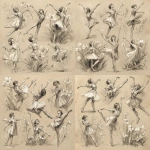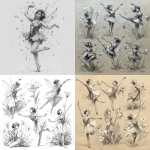Explore the Best AI Image Gallery

AI-Powered Imagery: Reshaping the Marketing Landscape
The realm of marketing is undergoing a seismic shift, fueled by the emergence of artificial intelligence (AI) and its ability to generate compelling visuals. AI-powered imagery is no longer a futuristic concept; its a tangible reality with the power to revolutionize how brands connect with their audiences.
A New Era of Creative Possibilities
AI algorithms are adept at analyzing vast datasets of images, learning patterns and styles to produce original artwork, product mockups, marketing collateral, and even personalized visuals. This opens up a world of possibilities for marketers:
- Enhanced Efficiency: AI can automate the creation of repetitive visual assets, freeing up designers to focus on more strategic and creative tasks.
- Cost-Effectiveness: Eliminating the need for expensive photography shoots or hiring freelance illustrators can significantly reduce marketing costs.
- Personalized Experiences: AI can generate customized visuals tailored to individual customer preferences, enhancing engagement and brand loyalty.
- Rapid Prototyping: Marketers can quickly iterate on design concepts using AI, accelerating the product development process.
Unlocking Marketing Applications
The applications of AI-powered imagery in marketing are vast and constantly expanding:
- Social Media Content: Create eye-catching graphics, animated videos, and interactive elements to captivate audiences on platforms like Instagram, TikTok, and Facebook.
- Website Design: Generate unique hero images, product visualizations, and landing page designs that reflect brand identity and resonate with visitors.
- Email Marketing: Personalize email campaigns with dynamic visuals that adapt to recipient data, increasing open rates and click-throughs.
- Advertising Campaigns: Develop targeted ads with visually compelling elements that capture attention and drive conversions.
- E-commerce Product Presentations: Showcase products in realistic 3D environments or create interactive virtual showrooms for immersive shopping experiences.
Navigating Ethical Considerations
While AI-powered imagery offers immense potential, it also raises ethical considerations that marketers must address:
- Bias and Representation: Ensure that AI algorithms are trained on diverse datasets to avoid perpetuating harmful stereotypes or biases in generated visuals.
- Copyright and Intellectual Property: Establish clear guidelines for the ownership and usage rights of AI-generated images, considering potential legal implications.
- Transparency and Disclosure: Be transparent with audiences about the use of AI in creating marketing content, fostering trust and ethical practices.
- Job Displacement: Consider the impact of AI on creative jobs and explore strategies for reskilling and upskilling workforce.
The Future of AI-Powered Imagery
As AI technology continues to evolve, we can expect even more innovative applications in marketing. The future holds:
- Hyper-Personalization: AI will generate visuals that are tailored to individual customer preferences and behaviors, creating highly personalized marketing experiences.
- Interactive Storytelling: Marketers will leverage AI to create immersive and interactive narratives, engaging audiences on a deeper level.
- Predictive Design: AI algorithms will analyze data to predict future trends and consumer preferences, informing the creation of impactful visuals.
- Seamless Integration: AI-powered imagery will become seamlessly integrated into marketing workflows, streamlining processes and enhancing efficiency.
AI-powered imagery is poised to revolutionize the marketing landscape. By embracing its potential while navigating ethical considerations, marketers can unlock new creative avenues and forge deeper connections with their audiences in an increasingly digital world.




](https://images.ai-img.art/thumbnails/150/cf8299cc184c859eff89d17514689e19c7994ad29256a58ad77fa0f7218e2cff.webp)
](https://images.ai-img.art/thumbnails/150/78b567a3483191dd52f3d16038b5a926e03e4066d5b301cfff023fb91a962e67.webp)


](https://images.ai-img.art/thumbnails/150/476665d1452e44d38d5b4fbf5fab4389a6131d55b7bfe8a41d7f65f66b5a9310.webp)
















](https://images.ai-img.art/thumbnails/150/aed4d771a0a5b63bed28f6e7183dd4614c5e3e3586d300c8d879ccbb37dbfb4e.webp)
















](https://images.ai-img.art/thumbnails/150/da89993919887fcf2c84af5ec12f2ac997ad0f67c8bf00fecd67ba06a1b3dc49.webp)

](https://images.ai-img.art/thumbnails/150/915b5e50ce61f6219cb8f764d89e2efcb8ad3a9ebd09e0670ae7dc0e2c99a8bd.webp)




